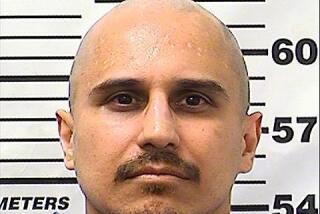Plea Deal OKd in Slaying of Santa Paula Woman
In a plea agreement that angered the husband of a slain Santa Paula woman, prosecutors have accepted a second-degree murder plea from the farm worker who drunkenly staggered out of a Santa Paula restaurant last year and fatally shot its popular owner.
The arrangement means that Felix Magana will not face a jury trial for killing 30-year-old Isabel Guzman.
Magana, 51, admitted shooting Guzman in an alley Nov. 2 and told prosecutors several weeks ago that he was willing to plead guilty to second-degree murder. That charge carries a lighter sentence than first-degree murder, which a jury could have convicted him of at trial.
Magana’s attorney urged the district attorney’s office to accept the offer, arguing that the evidence did not support a first-degree murder finding because Magana was too intoxicated to form an intent to kill.
After further consideration, prosecutors agreed.
“After reviewing all the facts, we believed it was a second-degree case and that is why we accepted the offer,” Chief Assistant Dist. Atty. Kevin J. McGee said.
But the decision does not sit well with Carlos Guzman, who said he told prosecutors he did not support a plea bargain in his wife’s slaying.
“It seems to me that we are negotiating with the criminals and I don’t think that is right,” Guzman said. “I don’t think they have the right to kill someone and then bargain and use the excuse that they were too drunk to know.
“I am not an expert,” Guzman added, “but I think it was pretty coldblooded murder whether he planned it or not.”
*
Guzman said he met with a prosecutor Wednesday morning and made his feelings known about the case.
Earlier that morning, Deputy Public Defender William Rutan said prosecutors told him they were willing to accept the offer and Magana pleaded guilty to second-degree murder in the afternoon.
Magana, a Santa Paula resident, faces a minimum sentence of 18 years to life in prison. Because of a separate allegation that he used a gun during the slaying, Magana could face as many as 25 years to life in prison.
But that brings little comfort to Carlos Guzman.
“Nothing they are going to do to this person is going to comfort me,” he said. “He destroyed my life.”
Oscar Gonzales, spokesman for the Mexican-American Bar Assn., said he believes there is some logic to the district attorney’s decision.
“Speaking personally, I am very familiar with the case,” he said. “I am not surprised by the D.A.’s decision. It was based on large part by the defendant being extremely drunk at the time of the incident.”
*
But Gonzales said he is bothered by what seems to be an inconsistent treatment of homicide cases by the district attorney’s office.
For instance, if the victim in the case had not been Latino or lived someplace other than Santa Paula, would prosecutors have been less likely to accept such an offer? he asked.
“Justice does not wear a blindfold,” he said. “If this had been an officer that had been killed by Mr. Magana, I have no doubts that the district attorney would have sought the death penalty. There is no rhyme or reason to it.”
Added Gonzales: “Once you plug in different characters in different places, it does yield different results.”
Attorneys for Diana Haun and Michael Dally--accused of murdering a white woman in Ventura, Sherri Dally--used a similar argument when they asked a judge to dismiss allegations that make their clients eligible for the death penalty.
But McGee argues that each case must be weighed on its own merits. And in the case of Magana, he said, there was legally no basis on which to seek the death penalty and not enough evidence to support first-degree murder.
“Every case is fact-specific, every case turns on its own facts and in this case the facts pointed to second degree and not first degree,” he said.
As for the district attorney’s policy regarding plea bargains, McGee said the bottom line is finding a charge that correctly describes the conduct of the defendant. In the Magana case, that was second-degree murder, he said.
*
The murder of Isabel Guzman happened about dusk on a Saturday last November. Magana had been drinking beer with his brother-in-law at La Playita on East Main Street, police said.
He was wearing two guns, a .357 magnum and a 10-millimeter semiautomatic, and showed them to at least two waitresses, according to testimony from his preliminary hearing in December.
Described as a drunk by his own attorney, Magana got into a verbal confrontation with a customer playing pool and was asked to leave by Isabel Guzman.
He seemed to cool down at first. But a few minutes later, Magana confronted Guzman in an alley behind the restaurant where she was unloading supplies from an ice cream truck.
Magana fired four shots at her with the .357 magnum, hitting Guzman three times, and walked away. Police arrested him in the area not long after and he admitted to the shooting while in custody.
“It is hard to explain why he did what he did,” Rutan said. “He was very intoxicated that evening.”
Rutan said his client’s blood alcohol level was about .30--four times the legal limit.
At trial, Rutan said, it would have been difficult for prosecutors to show motive or any evidence of deliberation to support a first-degree murder conviction because Magana was so drunk.
“It was simply an impulsive act,” Rutan said. “It fell into a classic second-degree definition.”
More to Read
Sign up for Essential California
The most important California stories and recommendations in your inbox every morning.
You may occasionally receive promotional content from the Los Angeles Times.










